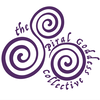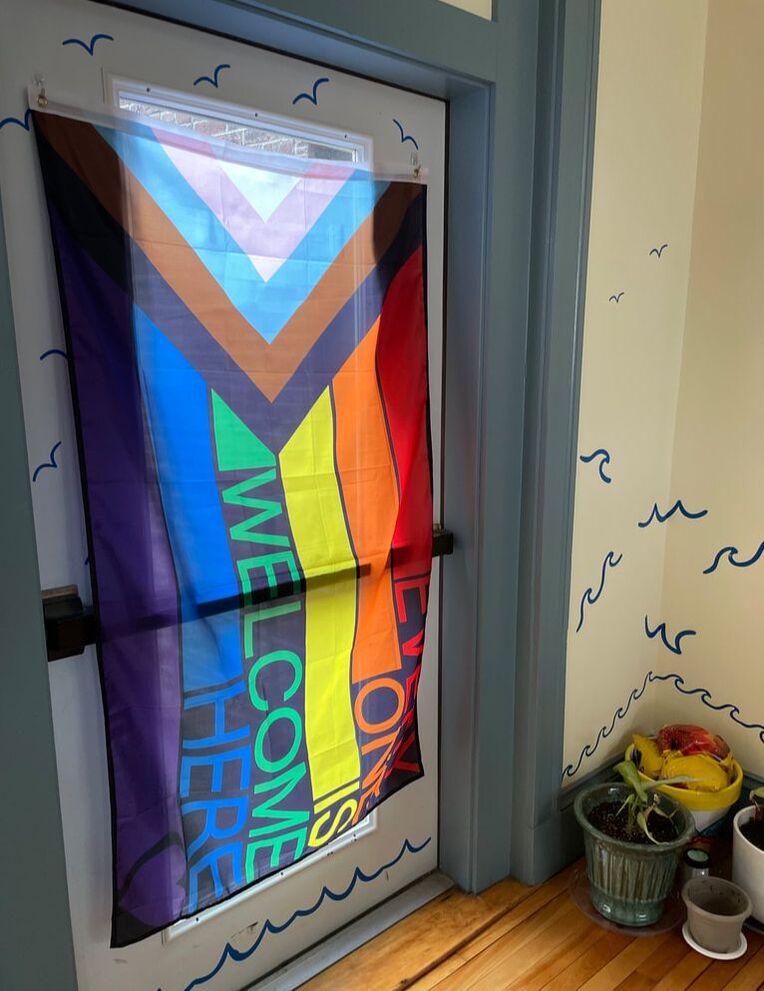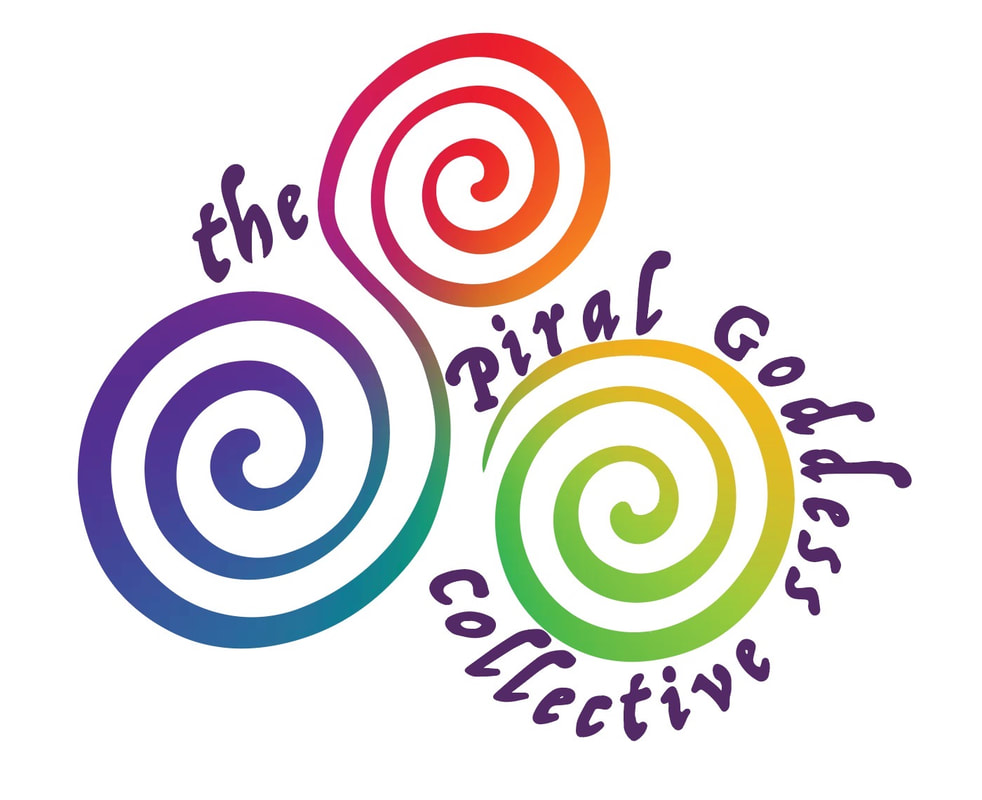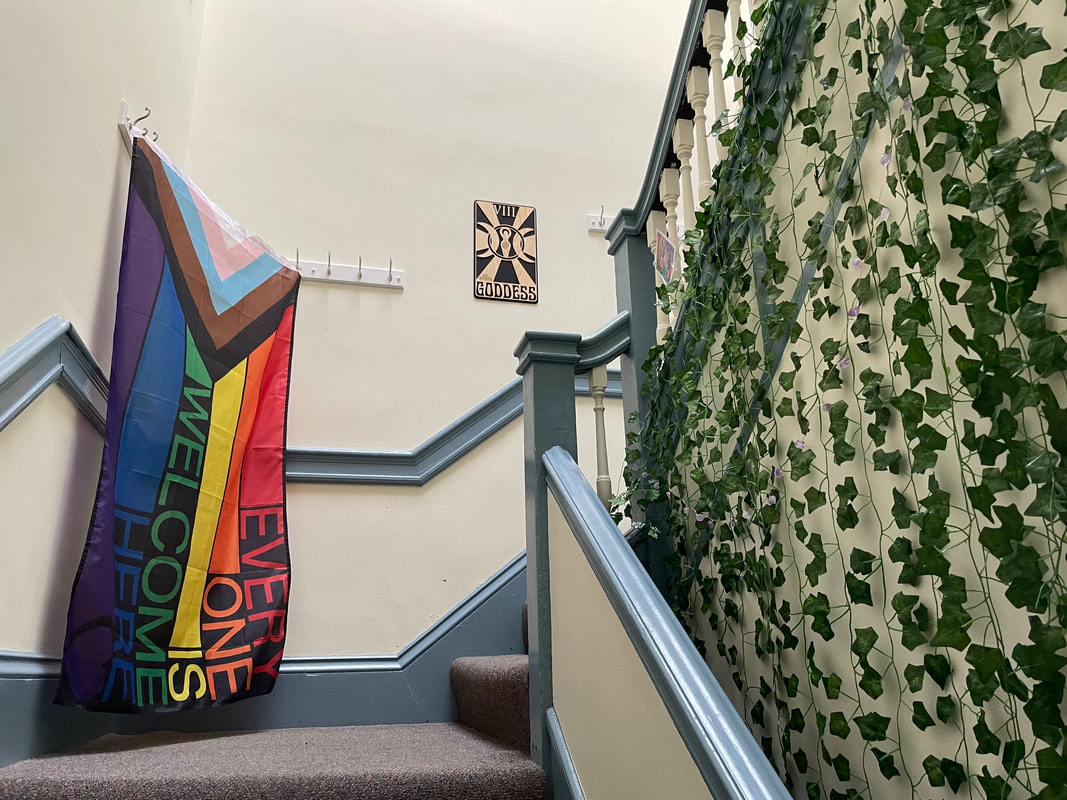|
Part of the reason I opened this space was to offer something to our community that is rarely found in other places and spaces dedicated to fitness, wellness, dance, or yoga—a space that is inclusive of all bodies and identities not just in word, but in practice. I wanted to bring my particular approach to yoga and movement, which is queer—unconventional, radical, inclusive, trauma-informed, creative, and “deeply rooted in truth, love, and justice,” as Jacoby Ballard describes (and as I quote in part 1 of this blog). There are many ways to be queer, and one way is to challenge gender binaries and social and cultural norms of all kinds.
Many gyms draw strict gender lines with offerings for men and women, reinforcing stereotypes that weight rooms are for men and group fitness classes are for women. Locker rooms where you have to choose to identify as “man” or “woman” will likely feel unsafe if your appearance is gender non-conforming. Some yoga classes offer a certain pose variation “for men” or “for women” and reinforce binaries of gender. The music used in a lot of classes reinforces heterosexual narratives about love and romance and stereotypes about men and women (and boys and girls). Further, many group fitness classes are populated by people who are thin and already “fit” and fat bodies are conditionally welcomed into that space if they want to lose weight, as if this is the only goal of moving one’s body. The messaging in and around group fitness is largely about losing weight—about changing your body to be more “fit” or “healthy,” which ultimately means more socially acceptable. But “fat” is not just a physical weight we carry; it is often related to trauma—the psychological weight we carry. And narrow cultural norms reinforce the psychological weight that queer people, and all socially unacceptable people, carry. Before opening The SGC, I taught fitness classes for over a decade at a community non-profit where I did not feel comfortable being out (and I taught fitness classes elsewhere for many years before I was brave enough to consider myself queer). I was discouraged from including “political” messages in my classes and promotions for classes. I taught a program where I was required to use music that often had lyrics that I found to be offensive to women and to reinforce stereotypes related to race and sexuality. But it was deemed “clean,” and context was ignored. Still, being in my fat body, leading a class, was the least I could do to push back again one of the norms of fitness spaces. More than once a new participant walked right past me to talk to the thin woman they thought must be the instructor. Too often, we are unaware of the limited scripts we participate in on a daily basis and most gyms and fitness centers prefer not to have these societal corsets pointed out. One of the worst examples from this past teaching gig is something that happens all the time in mainstream/corporate America. One day I walked in to the facility to witness a large, masculine person teetering around in high heels and “acting” like the female CEO because he had won the honor of “CEO for the day.” The staff filled the lobby as everyone laughed and cheered for this offensive display, which was probably considered to be a light, fun team-building activity. I felt extremely uncomfortable as I passed through to teach my class and imagined what it would be like to be trans and witness that display. I debated for weeks about whether I should say something to my supervisor or just let it go. I still regret that I let it go. So, opening The Spiral Goddess Collective is also an opportunity for me to be more brave, more open, and more in line with my values. This is part of “the potential for queer identity,” what Mattilda Bernstein Sycamore describes as “the radical potential to choose one’s gender and one’s sexual and social identities, to embrace a radical outsider’s perspective, to create a culture on our terms, and to challenge everything that’s sickening about the dominant culture around us.” The Spiral Goddess Collective embraces a radical outsider’s perspective. Despite a name that is feminine, and perhaps makes people wonder if men are allowed to attend classes and events at The SGC (the answer: of course they are and they do!), our space is pushing up against the boundaries of the norms of fitness spaces as well as the norms of social justice movements. The Spiral Goddess is not just a symbol for women—it is an archetype that informs what we birth into the world, how we use our energy, how we treat ourselves and each other, and how we connect our inner and outer worlds. Feminine qualities and values like collaboration, compassion, empathy, nurturing, and flowing are seen as weaknesses. Women are expected to work out to get hard, but not too hard. To be thin, but still curvy. We compete against ourselves as much as the other women in the room. And, women and femme people of all genders, have been excluded, abused, and threatened in fitness spaces (and the larger culture), to say the least. Men are made to feel like they have to be stereotypically masculine (competitive, linear, logical, assertive, independent, controlling), which just adds to the problems of our patriarchal world and the mental health problems of men, women, and children and everyone outside of these gendered categories. Individuals are forced to choose one side of the gender binary or to push back as non-binary, both of which can lead to violence against ourselves and others. At The SGC we embrace the radical, political meaning of queer and practice radical acceptance—we invite you to come as you are and to discover that you are so much more than you’ve been allowed to be. We invite you to start healing your wounds so that we might also heal the systems and structures that cause these wounds. Transformative healing happens form the inside out and the outside in. When we move our minds/bodies together, we are stronger—we are a collective of power and potential!
0 Comments
Queer is a reclaimed word. It is an umbrella term and denotes a spectrum of identities and sexualities that have been marginalized and demonized. I like this term because it is inclusive, political, and ambiguous; and the word also means unusual, not normal, odd, eccentric, and unconventional. To queer something, as Jacoby Ballard describes, is to “critique, challenge, and transform toward something more radical—that is deeply rooted in truth, love, and justice.” In this way, The Spiral Goddess Collective is a queer enterprise. And there are many ways to be queer.
Despite my professional life as a professor and fitness instructor—both things that appear to be the realms of the extrovert—I am a shy, introverted, home body who likes to spend time by myself—usually with a book and preferably with a cat or two or three. I’m not the type to yell from rooftops or wave a flag in a parade regardless of how passionate I am. When Hannah Gadbsy asks where the introverted queers are in her brilliant stand-up special, Nanette, I whisper “right here” and feel seen. When I filled out the forms to propose Bangor Pride Events—a Queer Yoga/Yoga Outside the Box event on June 17, First Friday Free Dance on June 2, and a table among the vendors at the Pride celebration on June 24, I was reminded about how much anxiety can come from inclusion and visibility. I’m sure I am not the only introvert who feels this anxiety when they are asked to expose semi-private parts of themselves toward a bigger cause. And yet, brave acts by marginalized people have created social change and continue to transform our world. I would like to be so brave, but my role is to support and facilitate. And I am far more comfortable behind the scenes. I have offered several events at Bangor Pride in the past through my role as a professor at UMA-Bangor. But now I offer these events through The Spiral Goddess Collective, a Center for Mind/Body Movement. Part of my desire to participate in Bangor Pride is to bring more visibility to the space and our offerings. We are a space where members of the LGBTQIA+ community can come for dance and yoga and healing modalities that are inclusive, trauma-informed, and social justice-oriented. And The SGC is a space where we want everyone to feel welcome. We are not simply a yoga studio; we are a center for mind/body movement. What we offer at SGC is not an ordinary approach to "fitness," dance, or yoga—it is something deeper and it is difficult to get people to come try something new, especially something that requires vulnerability and self-reflection. As Jacoby Ballard argues, queer and trans people don’t often have “the opportunity to be in their bodies as their whole selves” and a queer approach to yoga (and JourneyDance!) “creates expansion and spaciousness.” The Queer Yoga/Yoga Outside the Box event on June 17 is partially inspired by Jacoby Ballard’s book A Queer Dharma: Yoga and Meditations for Liberation. We all deserve to be in our bodies as our whole selves and this is one of the goals of SGC. Our work is inspired by a desire to make a difference in our community. We offer scholarships and encourage people to pay what they can. We offer a space where people can come together toward embodied wholeness—movement that isn’t about meeting the demands of dominant culture, but meeting ourselves where we are. |
CategoriesAll Academia American Fitness Art Business Care Work Careworkers Creativity Cultural Politics Fitness Guest Blogs Language Meditation Mind/body Self Care Self-care Social Justice Space Transformation Trauma Women And Fitness Yoga Archives
June 2024
|
|
|




 RSS Feed
RSS Feed